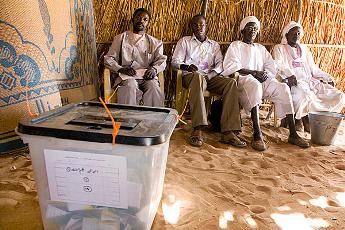Sudan’s ruling party hints at agreeing to early elections
August 17, 2011 (KHARTOUM) – Sudan’s ruling National Congress Party (NCP) have given the first sign that it might be willing to agree to early elections marking a stark shift in the position of the country’s dominant party.
 Sudan held nationwide general elections in April 2010 and the NCP secured a landslide victory in a vote marred by opposition boycotts and allegations of fraud.
Sudan held nationwide general elections in April 2010 and the NCP secured a landslide victory in a vote marred by opposition boycotts and allegations of fraud.
Following the secession of South Sudan last month, opposition parties have called for dismantling the government and installing an interim administration that would prepare for new elections.
The NCP has dismissed the idea saying that it has already received backing of the people through last year’s polls and as such it sees no need for early elections.
However, an NCP official today hinted that the party is now open to early elections.
Nazar Mahgoub, the NCP’s political secretary in Khartoum state, said that a growing number of party members are favoring calls for early elections despite the “legitimacy” the party enjoys in line with the elections’ outcome and provisions of the constitution.
Quoted by Sudan’s news agency (SUNA) on Wendesday, Mahjoub said the growing number of early elections’ supporters believe such a vote is vital to unify national ranks and offer concessions for rapprochement with political parties.
Prior to today’s remarks the NCP has insisted that opposition parties can only join the government as part of new cabinet which has yet to be formed to fill posts held by Southern Sudanese officials.
But opposition parties may still be unwilling to take up this offer given what they say as NCP control over state organs making it impossible to have fair and free elections.
The ruling party official said that talks with opposition parties are making headways and that there is a broad agreement on the next political roadmap.
However, he failed to confirm whether this agreement will manifest itself in the next cabinet the government says it wants to form in late August.
Al-Bashir’s party has been engaged in talks with the mainstream opposition National Umma Party (NUP), led by former prime minister Al-Sadiq Al-Mahdi, and the Democratic Unionist Party (DUP) of Mohamed Osman Al-Mirghani in order to reach a power-sharing deal.
Other opposition groups, most notably the Popular Congress Party (PCP) of Islamist leader Hassan Al-Turabi, remain publicly committed to regime-changing agendas and voice opposition to dialogue with the NCP which they accuse of a long list of failures, including the country’s breakup and worsening economic conditions.
Al-Bashir’s party revealed on Wednesday that the president intends to restructure the government by reducing members of the cabinet and splitting the country’s security apparatus to two branches.
One party official said that the NCP does not intend to allot any portfolios in the next government to the NUP and DUP, adding that the party was bent on slashing the cabinet whether or not NUP and DUP end up participating in the government.
(ST)
